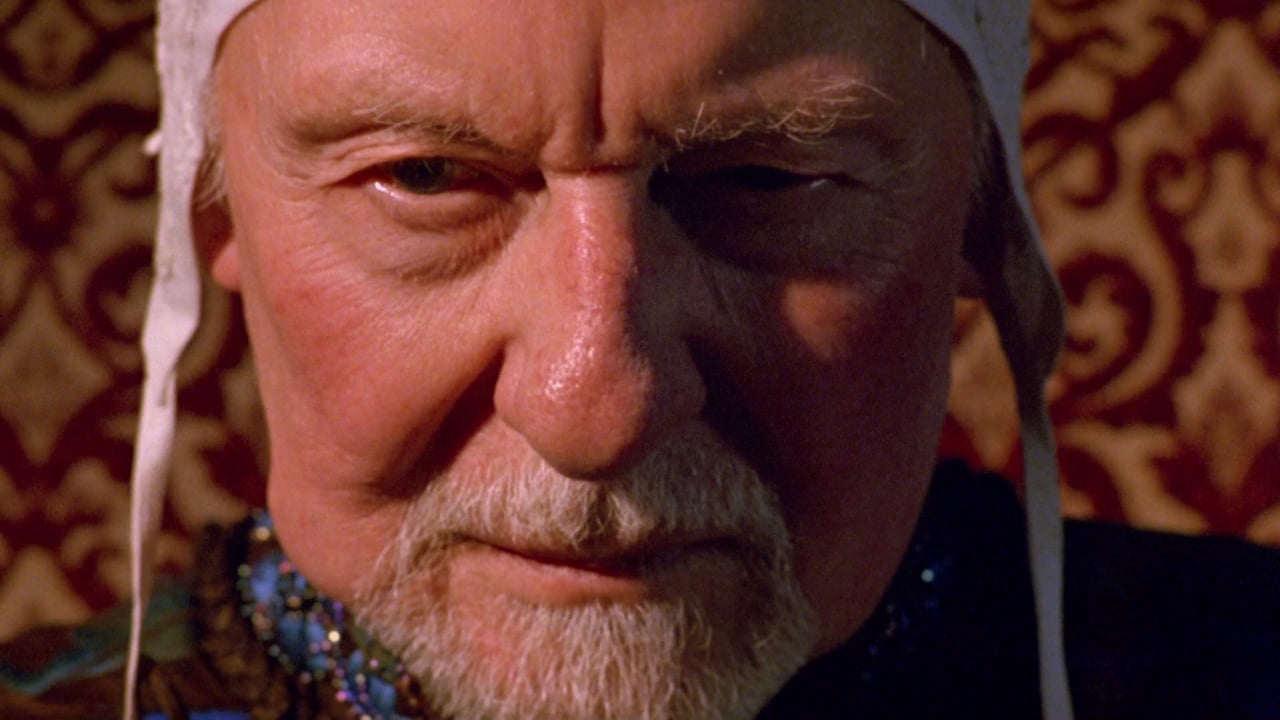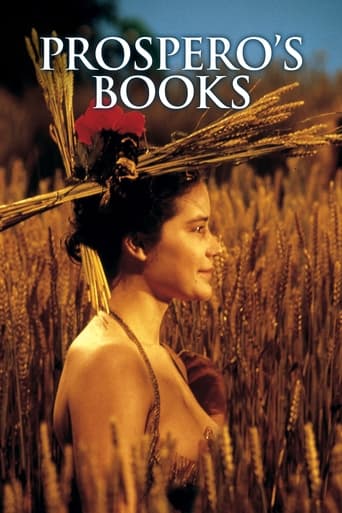AboveDeepBuggy
Some things I liked some I did not.
Exoticalot
People are voting emotionally.
Platicsco
Good story, Not enough for a whole film
Bea Swanson
This film is so real. It treats its characters with so much care and sensitivity.
Phillim
. . . it's a pity the aesthetic choice was made to *not* tell the story.That's my take-away from last night's viewing, my first since the film's theatrical release some 25 years ago. If you know Shakespeare's 'The Tempest' you'll fill in the narrative; if not, you'll have a splendid two-hour hallucination.But 'Prospero's Books' is the 800-pound gorilla of art films. Nothing like it before or since. F'ing glorious pile of exquisity.After Peter Greenaway's stunning vision, Michael Clark's Caliban is the star, along with the naked human body in all sizes, shapes and ages -- by the army-full, non-eroticized -- marginalia etchings come to life, caryatids, collossi, etc. Gielgud's celebrated voice murmurs most of the lines, but only somebody who didn't see it to the end (or parroting somebody who didn't) will make the false claim that no actor but Gielgud speaks. The sound is beautifully engineered, vocals and music.
Tom Harris
Right, first off, don't watch this movie if you're not familiar with "The Tempest," you will be wasting your time and won't be able to follow anything, and you'll waste more time coming on here moaning that you didn't understand anything and how it really sucks!Actually, it probably isn't enough to be just familiar with The Tempest, but to know it well and love it well. Every character and every line! Because, to me, it seems that this is not really an adaptation of The Tempest at all, it's a film about the creation of it. John Gielgud isn't really playing the part of Prospero but he's playing the role of Shakespeare himself as he is writing the play. The film is kind of set in the mind of Shakespeare and is part opera, part theatre, part musical, part acid trip gone wrong, part... too many parts to describe!The Tempest is a very special play. It was Shakespeare's last, and he probably played the part of Prospero. And there are a lot of connections between the journey of Prospero and Shakespeare's own life, culminating in the beautiful Epilogue speech, which is both a valedictory of Prospero and of Shakespeare. And all this with one of the greatest Shakespearean actors of all time performing all the voices!In summary, if you love Shakespeare, you'll love this film, you'll get the urge to revisit it often. If you don't, then neither waste your time watching it or cast your vote upon it - it's a disgrace this film has such a low rating!
Andres Salama
Once upon a time, Peter Greenaway was considered a serious artist. 1991's Prospero's Books ended that. To understand this, let's remember that in the 1960s and 1970s, Greenaway became known for some witty, short films playing with several of his obsessions, like counting, classification, sexuality, etc. He graduated to feature length films in the 1980s: after the (unwatchable) The Falls, he made a series of fine, intelligent, cerebral (if sometimes hard to take) art movies: The Draughtsman's Contract, A Zed and Two Noughts, The Belly of an Architect, Drowning by Numbers. These four movies, made back to back, are his best in a 40-plus year career. Then, in 1989, came The Cook, The Thief, his Wife and Her Lover, his most successful film so far, and a truly success de scandal, with his brilliant but often shocking images. After The Cook, everyone called him a genius, and he might have believed those accolades, since right after that he made one of the most self-indulgent (and unwatchable) films ever made: Prospero's Books. An adaptation (for lack of a better word) of Shakespeare's The Tempest, made at the request of its star, the octogenarian John Gielgud (who have played the part of Prospero on stage, and had unsuccessfully asked a number of prominent directors to bring the play with him to the screen), this film is truly terrible: shot entirely on a sound stage, is a parade of naked people, awful use of digital imagery (which has rapidly look obsolete with the passage of time), and poor old Gielgud speaking all the parts (!). The movie looks as the filming of a Shakespeare play as made by an idiot savant, except that this idiot doesn't even look here to be very savant. Not surprisingly, few people liked Prospero's Books. After this fiasco, Greenaway has continued making movies, as well as exhibitions for museums, but with the exception of The Pillow Book, almost no one has watched them, or care for them.
skallisjr
The film is an adaptation of The Tempest, to be sure, but taken to imaginative heights. The photographic imagery is complex and rich, and slowly the story unfolds. Unfortunately, more slowly than necessary.Within many of the scenes is a staggering number of naked people who are no more contributory to the story than any building or fountain. There are numerous glimpses of pages of some of the books, with rapid changes of images, each so quick that they border on the subliminal. Interestingly, some of the arcane images were executed after the time the story was supposed to be taking place.The story of the Prospero-induced storm, and the interactions with the survivors and both Prospero and his daughter are familiar to most, but the plot advances slowly, probably too slowly for many viewers.There is a tradition in some magical philosophies that a magician derives his or her powers directly from whatever magical books he or she possesses, and this was presented in the film, from the play.(Spoiler) At the close of the film, Prospero's books are all destroyed save one. That one was one of Shakespeare's plays -- and the one the film is based on! That was a jarring touch.

